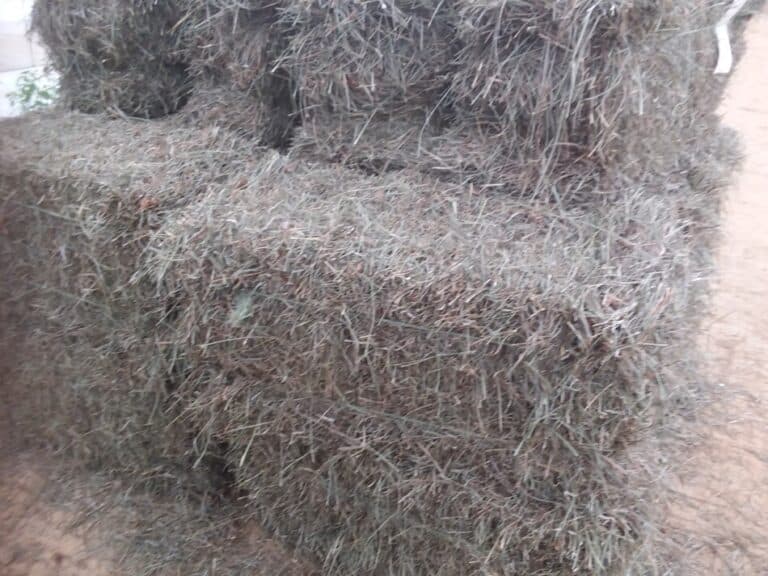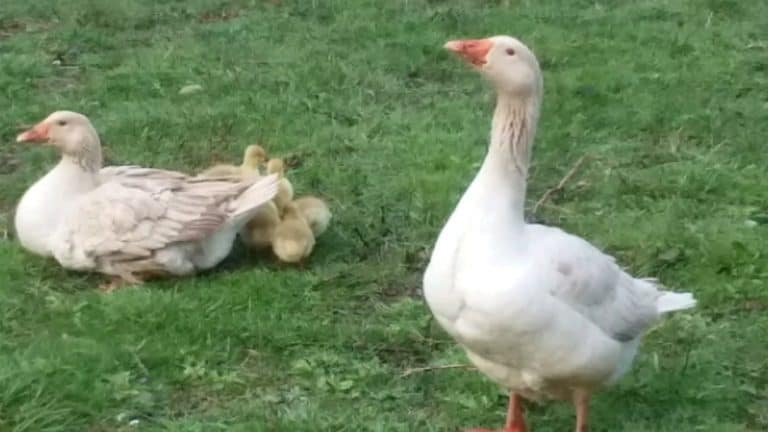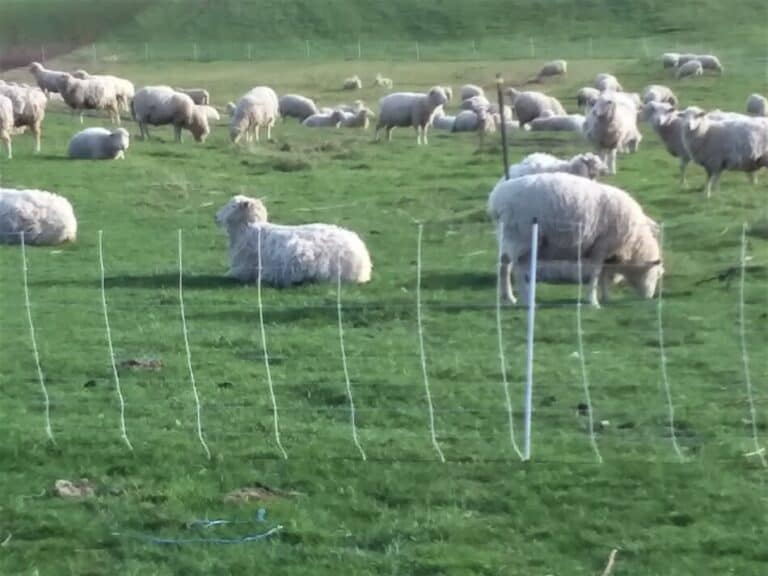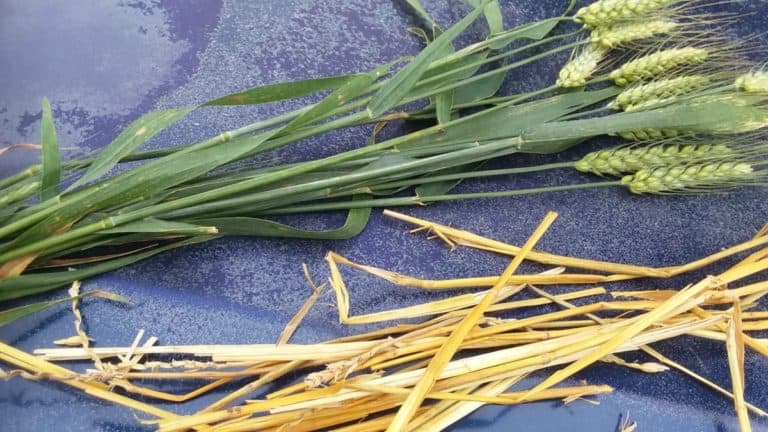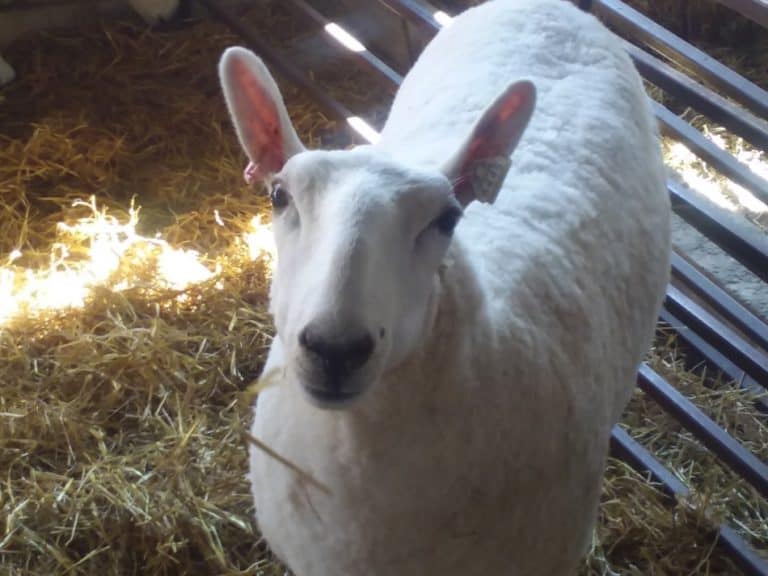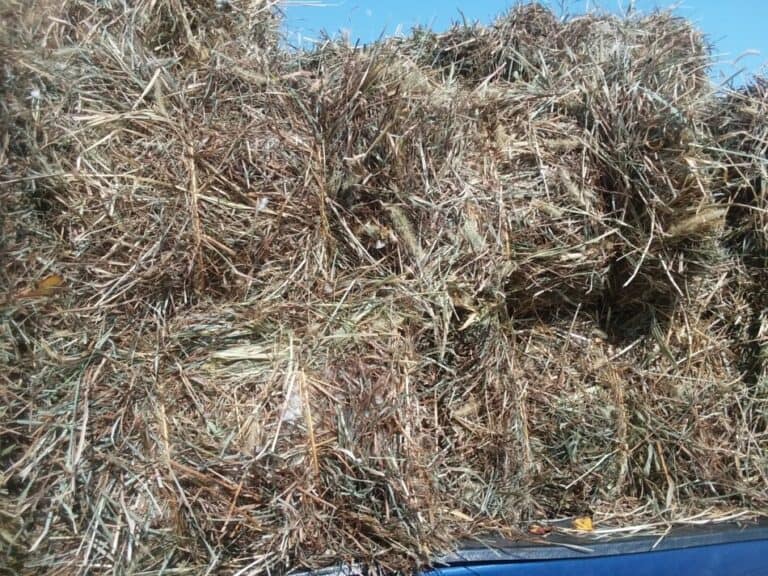5 Farm Animals That Can Be Raised With Cattle
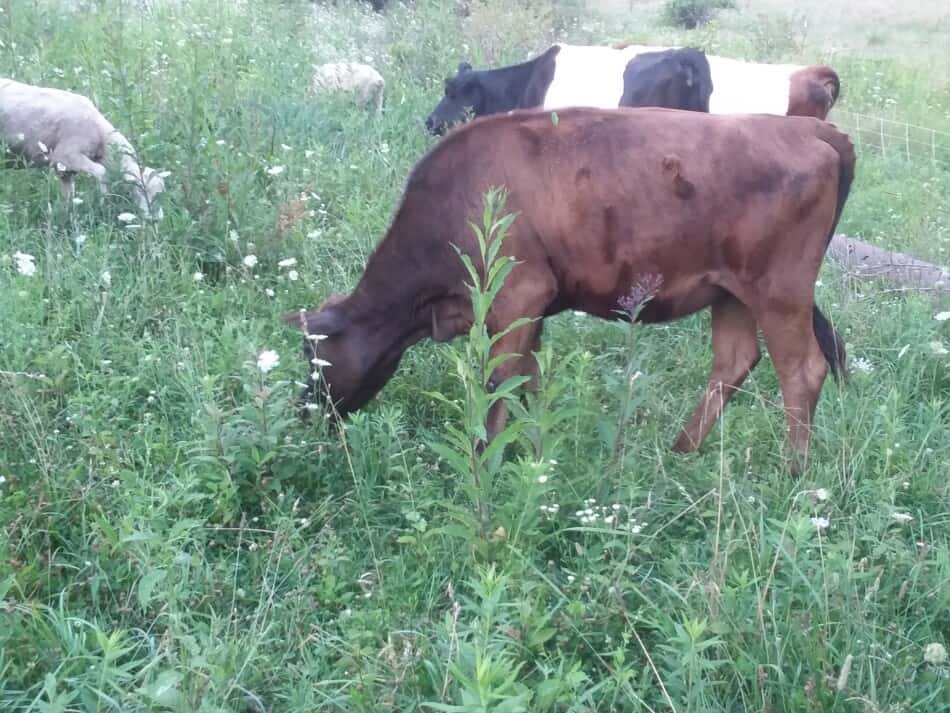
Maybe you’d like to try multi species grazing with your cattle or maybe you are just wondering if you could simplify your chores by putting other animals with the herd?
Great news! There are some animals that will work well with your cattle! There are also a few species combinations that are definitely not a good idea, we’ll go over those, as well.
Farm animals that can be raised with cattle are sheep, goats, chickens, ducks and geese. The sheep and goats will eat some of the forages the cattle do not eat or do not like and the poultry will eat nuisance bugs and weed seedlings.
Read Beginner’s Guide To Feeding Cattle for details on figuring up what hay and grass you’ll need for your herd.
Sheep can be raised with cattle
Pros: Sheep eat the same pasture as cattle and for the most part do not transfer parasites back and forth between them
Cons: Sheep need a better fence, closer monitoring to be productive than cattle and can not have access to the mineral blocks that are made for cattle
Cattle and sheep can graze together, but the cattle will be the bossy ones
Sheep and cattle graze together well. The cattle will be a bit pushy with the sheep and are definitely the first ones to get anything good, meaning the cattle will push through the sheep to get first dibs on high value items.
Raising Sheep For Profit is an article I put together to give you an idea of the income potential of your flock.
Sheep and cattle do not share parasites
One of the best things about raising sheep with cattle is that these two species do not pass many parasites back and forth. None that I’m aware of, but I might be missing one or two.
This non transfer of parasites is great since every sheep parasite a cow eats doesn’t live on to cause problems, the same with any cattle parasite that the sheep eat, that’s a dead end for that parasite.
Here’s a great article Prevent Parasites Through Grazing Management by Melanie Barkley which goes over both sheep and goat grazing.
Sheep need a more substantial fence than cattle
The less great news about combining cattle and sheep is that sheep need more of a fence than cattle.
I know that there are a few folks out there with sheep trained to interior single strand electric, but that’s not how it works for us and our sheep. We use electric netting to hold the sheep and, of course, the netting holds the cattle too.
A heads up for anyone thinking of putting sheep on a single strand of electric with your cattle: it takes a few months of training the sheep and culling out the non conformers.
The other catch that is overlooked is that the sheep on single strand electric are in a paddock that has a substantial perimeter fence, like five strand high tensile. The single strand is just for the division wire.
Sheep need more management than cattle
From what we have seen, sheep need more management than cattle. If you are willing to check over the sheep twice a day, sheep can perform really well for you.
If you are not willing or able to check the sheep, they will have problems that you will miss, since you didn’t see it soon enough to fix it, and you’ll be disappointed with the flock.
I have seen some sheep being raised more like cattle, Grandview Livestock is an example. The site shows goats, but he has a flock of sheep being managed in the same manner.
This is a farm in Kansas that has Hopping Brothers hair sheep that are bred for lower management needs. Definitely watch some of Grandview Livestock’s channel videos to see these sheep in action.
I’m mentioning Grandview to point out that low management sheep is possible, as long as you have the genetics that can be handled this way.
Our flock, and I’d figure most other flocks, need more management to be productive.
Sheep may need to be separate at lambing
During lambing cattle could be a problem for the ewes and the new lambs. It would be a rare ewe that will be brave enough to keep cattle away from her babies.
I’m not saying the cattle are mean, they are just curious, but that is interfering with the ewe taking care of her babies and needs to be stopped before it becomes a problem.
It would be best to separate out the cattle and the sheep until the lambs are up and going well, at least until you can’t catch them because they are too fast.
How Much Will My Lambs Sell For? is an article I wrote to show you how to read a market report to determine if raising sheep will be a profitable addition to your farm.
Goats can be raised with cattle
Pros: Goats eat some of the plants, especially weeds and brushy growth, that your cattle herd will be skipping over and goat do not have the same parasites as cattle.
Cons: The main problem with goats is fencing, goats are escape artists. Goats are also very likely to have parasite problems in wetter conditions, goat like dry and warm, but your cattle like cooler and wet.
Goats will eat plants your cattle are leaving behind
The best news about putting goats with your cattle is that the goats will expand the use of your pasture by eating the plants that your cattle are leaving behind and as mentioned above, cattle and goats do not share parasites.
Sheep Or Goats : Which one is more profitable? is an article I wrote to help you decide which small ruminant would work best for you and your farm.
Goats are much more challenging to fence than cattle
The not so great news about raising goats with your cattle is that goats are excellent escape artists. They thrive on creative ways to get out of a fence.
That single strand that is keeping your cattle in is nothing to your goats. For you, this might not be a big deal if the goats stay with the cattle but not necessarily in the pasture with them all of the time. For us, this won’t work.
Here’s a farm that is handling goats like cattle, Grandview Livestock. I mentioned this place in the sheep section, but they are more well known for their goat program.
What Is The Current Selling Price For Goats? shows you how to read a market report to figure up if goats would be worth adding to your farm.
Chickens like to be with cattle on grass
Pros: Chickens eat bugs in cattle manure to keep down flies, scratch out the manure piles, do not share the same parasites and do not compete much with cattle for grazing
Cons: Chickens will wander (unless they are in a chicken tractor), need grain that the cattle will eat if they can and are predator magnets
Chickens and cattle together are a wonderful combination to benefit both species. The cattle enjoy better pastures and less bug harassment, since the chickens are eating maggots and scratching out manure piles.
Chickens definitely do not have the same parasites as cattle and do not compete with the herd for grazing. Chickens do eat grass, but a small amount and only the shorter stuff that is left after the cattle have grazed and area first.
The down side of chickens is that they are uncontainable in most cattle fences and are predator magnets. If you need the chickens to stay in place, the fence to keep them in will be expensive to put around the whole cattle pasture, as well.
As far as predators liking chickens, this is not a risk to the cattle or calves. The predators prefer an easy lunch of a sleeping chicken to the hard work of snatching a calf.
It’s more that the chickens will require more predator protection in the field overnight than the cattle, a lot more.
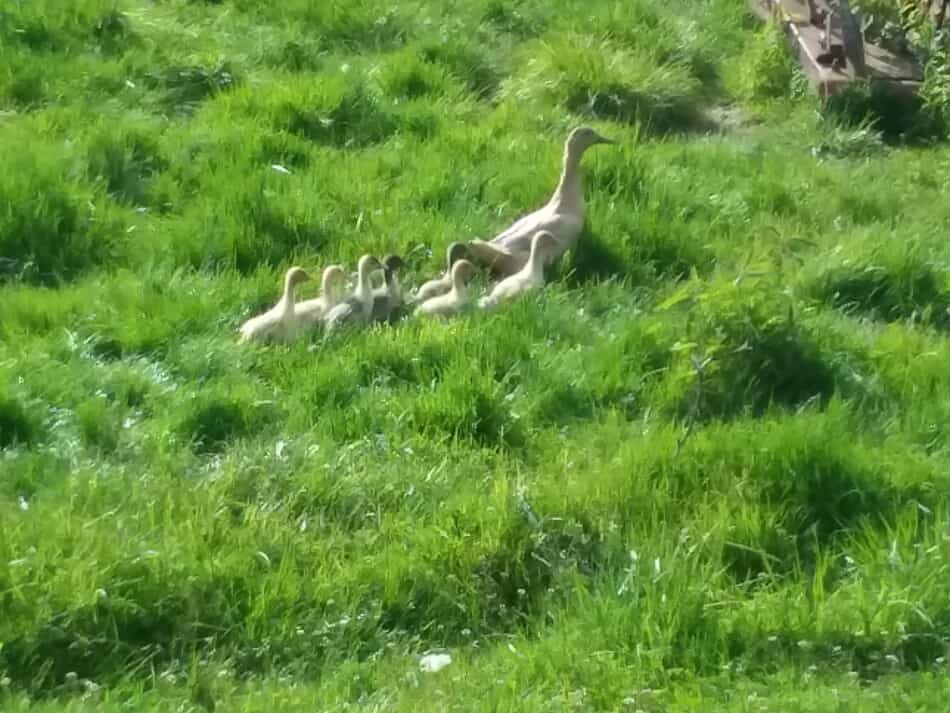
If you are willing to pen up the chickens, at least at night, then they will love to be out with the cattle. If you don’t want to go to the work of penning up the chickens, they will become predator snacks sooner rather than later.
Cornish Cross or Red Rangers: Which broilers should you raise? will go over the differences in the two meat chickens that I noticed when I raised them both in the same batch.
Light breed chickens, the smaller bodied egg layers, might do better since they can fly a bit and roost high at night. But more likely you’ll need to have a closed coop for them to keep them safe.
As with all of the other poultry in this article, chicks need to be kept separately from the cattle until they are fully grown.
If you are putting your chickens in a chicken tractor, like for broilers, you should know that the cattle will reach in the top and steal chicken feed, if it does not have a cover.
My milk cow, Aleene is the master at this maneuver! Sadly, it took me a few days to catch on!
Ducks like to be in cattle pastures
Pros: Ducks love to go out and dibble through cattle manure piles and do not compete with the cattle for food or share parasites.
Cons: Ducks need a different fence than cattle, are easy hits for predators and will make a mess of any water trough they can get into.
16 Breeds of Ducks for Eggs and Meat gives you our take on duck breeds, based on the breeds we have raised, and will help you determine which breed will suit you the best.
Ducks love to follow cattle on the pasture
Ducks, at least our ducks, will go out to the pasture on a daily jaunt to find snacks and take a dip in the creek. The ducks go through the fence, netting and woven wire, to wander as they please.
They poke through all of the manure piles and eat some of the shorter more tender plants like grasses and weeds. Any taller growth, they don’t try to eat, but they will eat seed heads once the plants mature.
One of the best things about ducks is that any water your ducks can get to will remain bug free, or as close to bug free as they can make it. Ducks love to eat mosquito larvae out of standing water like puddles and ponds.
Ducks are limited walkers compared to cattle
The down side of ducks is that they do not travel as well as the cattle. Don’t get me wrong, ducks can walk but not like the cattle herd, do don’t expect the ducks to be able to keep up with the herd if your cattle cover a lot of ground.
Ducks are predator magnets
Ducks are predator magnets, especially at night. Unless your ducks have protection on the pasture, they will be eaten when they stay out overnight.
This is why our ducks come back to the barn at night. I would be okay with them staying out on the pasture, to keep all of their manure out there, but they are such an easy target at night they have to come back in for their own safety.
Ducks need different fencing than cattle
If you need the ducks to stay in the pasture, you’ll have to up your game, fencing wise. At least for the lower 2 feet or so of the fence, it needs to be more of a garden fence to keep the ducks in place.
Word to the wise, Muscovy ducks can fly. Not well enough to go south for the winter, but definitely well enough to clear the fence!
Ducks make a mess of any water they can get into
The final note as far as ducks and cattle are concerned is that ducks make a huge mess out of any water source they can get into.
Usually cattle would be drinking out of a trough that is high enough that ducks are too short to get in, but not always, especially if calves can reach the water.
If you see ducks in the cattle trough, be sure to check the condition of the water. Chances are it’s not great and needs to be changed.
The real issue here is that the ducks are dibbling through the manure then go rinse off their beaks in the closest water, which is the cattle trough, yikes!
If the ducks can actually get in the trough, you’re also getting tons of duck poo in the water, as well.
I love having ducks around, but this fouling up the water for other animals tendency they have is one of the few things about ducks that I could do without!
Full grown ducks can be with cattle, not ducklings
The ducks that can be out with your cattle are adult ducks, not ducklings! Ducks grow quickly, so you won’t have to keep them separate for long, but until the ducks are full grown, keep them out of the cattle pasture.
It’s not that the cattle are mean, it’s more that the ducklings are awkward and tend to overreact, so they can get hurt. Once they are full grown, your ducks are good to go.
Geese enjoy grass in cattle pastures
Pros: Geese love to eat short, tender grass and weed seedlings
Cons: Geese will mess up the cattle water trough and need night protection from predators.
Geese eat short, tender grasses and weeds
Geese are grass eaters, but do not compete with the cattle. The cattle will graze down an area first, then the geese will come through and eat smaller weeds.
The first pass through the pasture is for the cattle, who can handle the bigger leaves and taller plants.
Are Geese Easy To Raise? gives you the scoop on what’s all involved with taking care of geese, from goslings to adults.
Geese will make a mess out of a water trough
The downsides of geese are that geese will climb into a water trough if they can and poop in it, sad but true.
Geese need different fencing than cattle
Geese are also more challenging to fence in than cattle. Geese will go through woven wire and electric netting.
Maybe the poultry netting would contain them, we don’t have that kind so I don’t know, but the sheep netting does not keep geese in place. Our geese go through it all of the time, even though the netting is on!
I’m not saying geese are hard to fence in, they are actually easy to keep in. I’m just pointing out that they require a different type of fencing than cattle.
Think of more of a garden type fence that would have closer spaced wires but still be shorter than most cattle fences.
Goslings need to be raised separately until they are full size
To be clear, I am referring to adult geese here, not goslings. If you have goslings, they will need to be raised separately from the cattle until they are adult size and can take care of themselves. Goslings will get hurt out with the cattle.
The great news is that goslings grow quickly, so they will be full size in no time!
